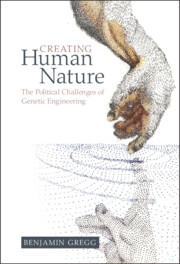Book contents
- Creating Human Nature
- Creating Human Nature
- Copyright page
- Dedication
- Contents
- Acknowledgments
- Introduction
- Part I The Political Bioethics of Regulating Genetic Engineering
- Part II The Political Dimensions of Engineering Intelligence
- 5 Threshold Capacities for Political Participation
- 6 Political Capacity of Human Intelligence and the Challenge of AI
- 7 Political Ambiguity of Personalized Education Informed by the Pupil’s Genome
- Part III Inequality as an Unintended Consequence Locally and as a Planetary Phenomenon
- References
- Index
7 - Political Ambiguity of Personalized Education Informed by the Pupil’s Genome
from Part II - The Political Dimensions of Engineering Intelligence
Published online by Cambridge University Press: 13 October 2022
- Creating Human Nature
- Creating Human Nature
- Copyright page
- Dedication
- Contents
- Acknowledgments
- Introduction
- Part I The Political Bioethics of Regulating Genetic Engineering
- Part II The Political Dimensions of Engineering Intelligence
- 5 Threshold Capacities for Political Participation
- 6 Political Capacity of Human Intelligence and the Challenge of AI
- 7 Political Ambiguity of Personalized Education Informed by the Pupil’s Genome
- Part III Inequality as an Unintended Consequence Locally and as a Planetary Phenomenon
- References
- Index
Summary
This chapter analyzes the political dimensions of the following question: Might genetic analysis of each pupil’s cognitive talents and needs someday allow teachers to tailor curricula in ways more beneficial to individual students, toward improving the relative educational performance and attainment of individuals at the elementary level? The analysis identifies fundamental ambiguities in evaluating the potential benefits, as well as the potential harms, of deploying genetic information with the goal of improving primary education. While most other chapters in this book focus on the possible engineering of the human genome, this one seeks instead to illuminate the distinctly political questions raised by the use of a pupil’s genetic information to design a curriculum personalized for her learning advantage as predicted by that information. For questions raised about possible future institutional and pedagogical practice are not only scientific, technical, and pedagogical. They are also political in the sense of posing normative questions, above all: If the proposal one day became technically possible, how might a political community best respond to a development in education of potentially great consequence? Persons of competing value-commitments will respond to this question differently. And should agreement ever be possible at all, it could only be constructed politically.1
- Type
- Chapter
- Information
- Creating Human NatureThe Political Challenges of Genetic Engineering, pp. 141 - 156Publisher: Cambridge University PressPrint publication year: 2022

